Inclusion to me means a world with no barriers where those with disabilities aren’t seen as weak but valued for their strengths.
Community Spotlight: The Blind Poet - World Poetry Day
by Ming Wu
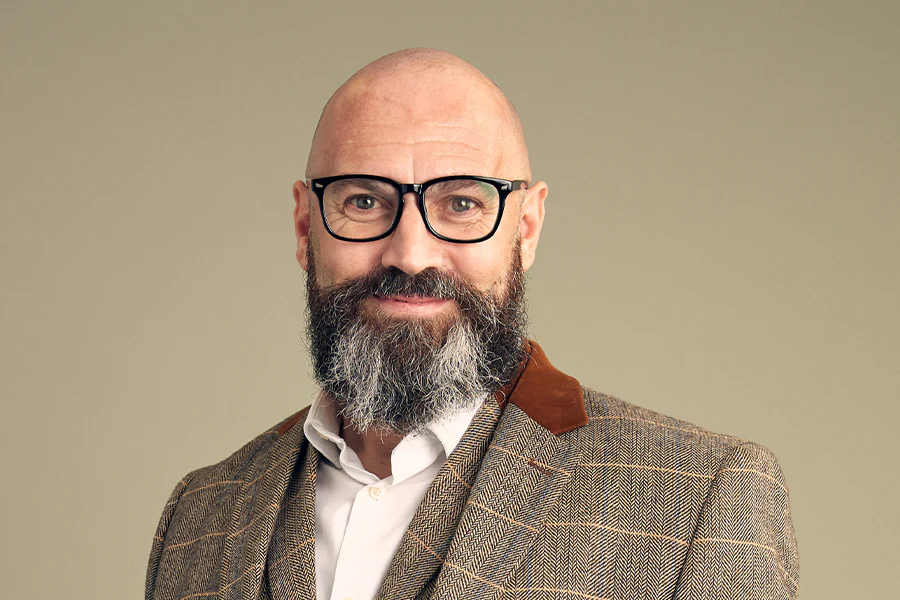
Dave Steele, ‘The Blind Poet’, uses words to help those experiencing vision loss understand their emotions as they navigate their journey. He also uses poetry to change society’s perceptions of vision loss for the better.
Dave’s story
Dave had known there was a chance he’d inherited Retinitis Pigmentosa (RP), a condition, which causes the retinas to deteriorate, and results in vision loss, then blindness. But it wasn’t until he was in his thirties, that he was diagnosed.
“It was April, in 2014, my wife and I, have just set a date for our wedding and our son was eight months old. I was doing a visual field test as part of a routine eye exam, and as the test went on, I realized I wasn’t clicking the button. I wasn’t seeing anything. I was advised to stop driving right away, referred to a retinal specialist, and two weeks later, I was declared Severely Sight Impaired, which means I was legally blind.”
Suddenly, Dave’s life changed. For almost a year, he and his family struggled to adjust as Dave’s sight loss set in.
“I lost my job. I was working in car sales at the time, and I could no longer do test drives. I was also working as a singer, and I couldn’t get to any of the gigs because I couldn’t drive. My daughter from a previous marriage, lives in Glasgow, and I used to drive there every other week to see her, and I couldn’t do that anymore. I fell into this depression, not because of the sight I was losing, but because of the changes and the pressure it put on my family. We lost our house because we couldn’t afford the rent. We moved into social housing and fed our family from food banks.”

Finding his voice
The turning point came, when Dave’s sister, who also has RP, suggested connecting with others who had similar experiences. After joining some support groups on Facebook, Dave was invited to an in-person meeting.
“That was the catalyst. It was a support group for people with RP and Usher’s Syndrome. They’d heard that I had previously worked as a singer and asked me to be the entertainment that day. I said yes, because that took away some of the anxiety I had about it being my first time being around people who were losing their sight or were blind.
The night before the event I had this idea of changing the words to ‘Stand by Me’, by Ben E King to express how I felt about RP and my vision loss so far. When I performed the song the next day, that’s when I found I had the ability to voice what others were feeling through the words I was writing.”
From the time he first performed this song, later known as ‘Stand By Me RP’, Dave felt the most natural thing for him was to keep writing. His experience of songwriting helped the transition into writing poetry about his sight loss. It came naturally and sometimes he would write two or three poems in one day. Dave feels this outpouring of self-expression helped him come to terms with his sight loss. However, it was when he posted his poetry on social media, he saw the magic happen.
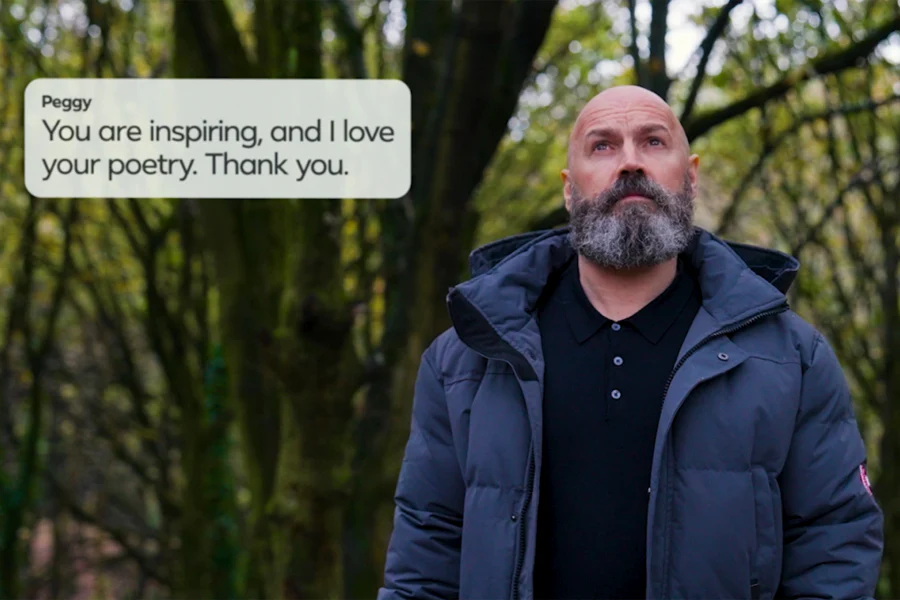
Photo credit: Meta
“People said not only were my poems helping them feel less alone, but they used my words as a way to explain how they feel to their loved ones, when they couldn’t find the words themselves.”Dave found the more his poetry helped others, the more it was helping him too.
“Hearing what people were saying, gave me a sense of purpose when I was struggling to find one. I didn’t know my place in the world anymore. The responses I was getting made me want to help more people and be there in a way that I had wanted someone to be there for me and my family, at the beginning of our journey.”
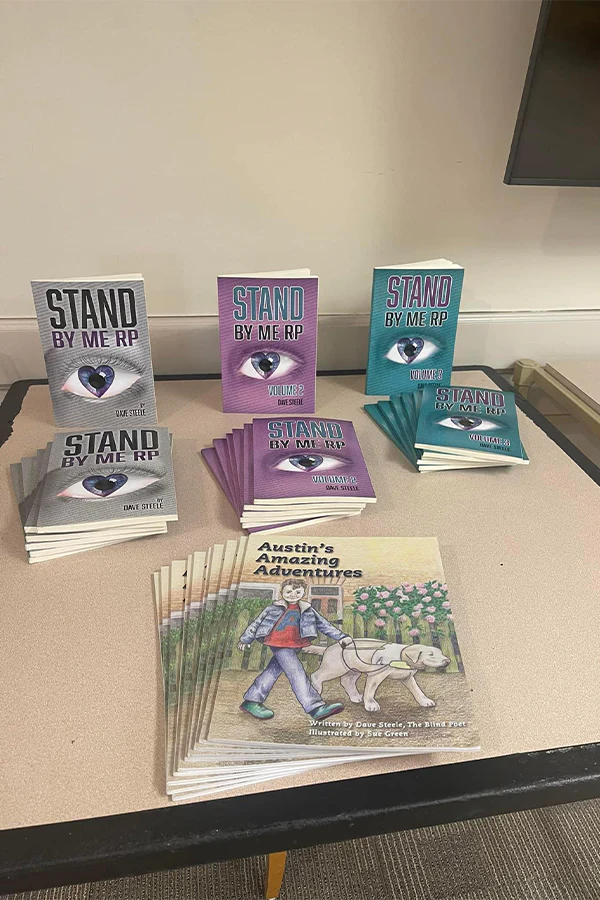
Stand By Me RP, 1, 2 and 3
At that time, Dave wasn’t aware of the future impact his words would have on the blind and visually impaired community across the world.
He quickly built a collection of more than 100 poems, and a growing community on Facebook.
“People were messaging me saying I should put the poems into a book. I didn’t have a clue how to do that. The online community started a ‘Go Fund Me’ campaign and help me self-publish my first book.”
With the support of his community, Dave’s first book, ‘Stand by Me RP’, launched in February 2016, the same day he received a call from Guide Dogs UK who had found him a match after an 18 month search.
“In the first week ‘Stand By Me RP’ became the number one European poetry release on Amazon in Australia and America. That was just the first week! Then it just built from there. Book 2 came out the following February. This time, in the first day, it was number one European poetry release on Amazon in Australia and America. Then volume 3 did the same thing.”
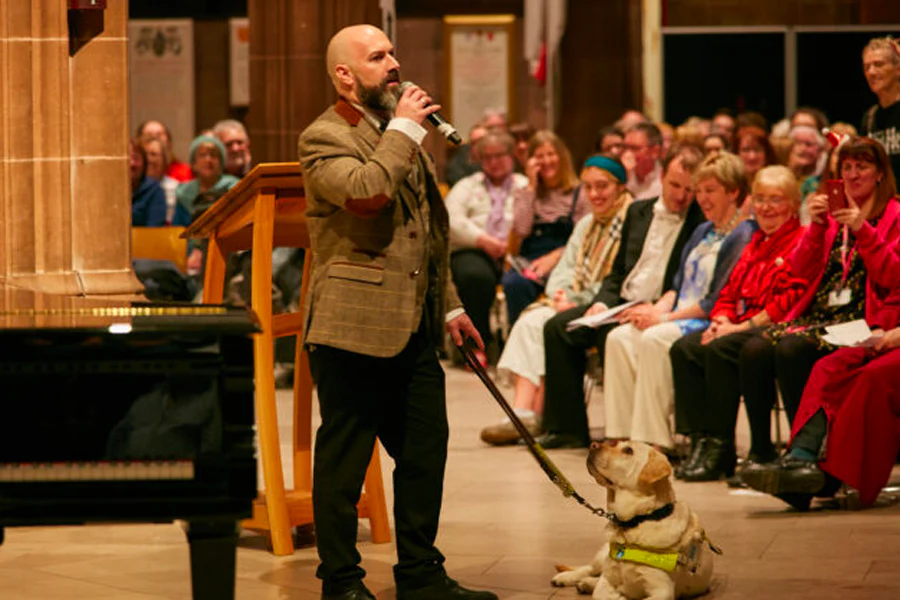
Stand By Me RP, 1, 2 and 3
In 2019, Dave embarked on his first book tour in the US, where he was blown away by the positive response he received.
“I spoke at some varied events. Sometimes there would be 20 people in the room and sometimes there were several hundred, but the response was the same, it was incredible. I feel like it’s the same whether people are affected by disability, low vision, blindness or not. Those who are, can empathize with what I’m saying, and those who are not can close their eyes and use the words as a way to put themselves in our shoes.”
After a period of losing his way following sight loss, it seemed that now, Dave really had found his purpose again.
“I’m a great believer that things happen for a reason. All the good things and bad things that happen in our past give us the tools to face the things that we have to face going forwards. My time as a singer set me up to understand flow and writing. Being homeless and struggling with depression, gave me an inner strength that allowed me to deal with losing my sight and be open enough to talk about it, so I can help others.”
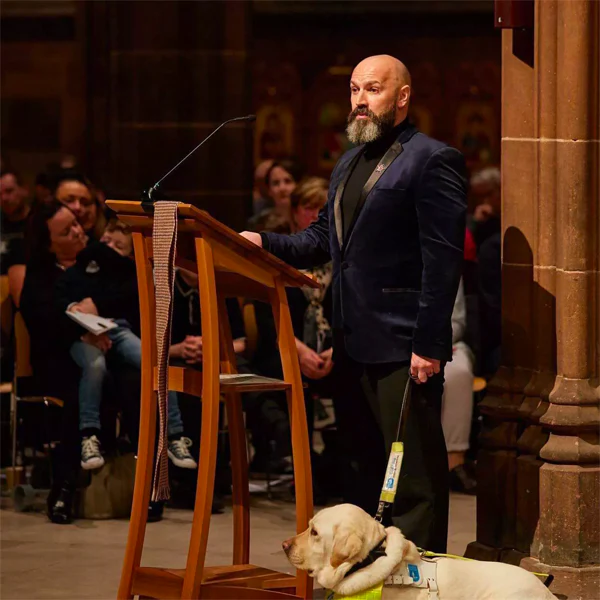
Enabling voices
Dave’s motivation is a sincere desire to support others, and recently he has found a more hands-on approach to doing that.
“I’ve worked with The Lighthouse for the Blind and Visually Impaired for some time now, and we’ve recently started doing poetry workshops. I’m teaching my technique of writing poetry to people who are losing their sight and people with a range of disabilities and individual challenges. I want to enable them to voice their own experiences through poetry. We’ve had people who have written about loved ones who have passed, and they have never been able to talk about it before. We had people talking about their autism in a way they never felt they could voice before.”
Dave understands that vision loss, and other life-changing events can affect people in a way that they might not understand, and therefore find it difficult to manage. He hopes that encouraging people to express themselves using his unique way of writing poetry, can help them navigate those feelings.
“We sometimes turn to music, for a song we can relate to, or a song that can lift us up. Poetry can do the same thing. It’s natural to feel down sometimes, but you can channel it this way. Teaching my very simple technique to write poetry, gives people the confidence they need to say things they didn’t know how to before. Building confidence and focusing on mental health is a big part of what I do.”
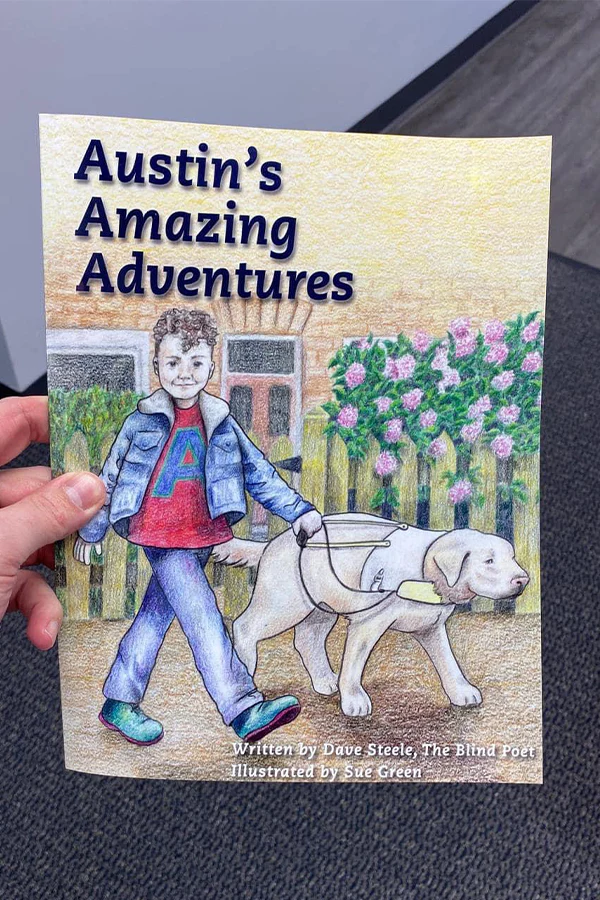
Austin’s Next Amazing Adventure…
Dave’s children’s book, ‘Austin’s Amazing Adventures” is a poetic story that introduces the character, Austin, a boy who is losing his vision. The reader follows Austin and his guide dog Joe, as they have fun and navigate the challenges of blindness together, as Austin does all the things that children do. These rhyming stories are designed to raise awareness of blindness in a way children can understand.
“The first book is about normalizing low vision and blindness for all children and giving children who are blind or low vision, characters they can relate to. Dave explained that future books will use poetry to discuss different disabilities like autism and wheelchair users.
Dave is currently working on a very special project. Dave recently lost a nephew Josh, to Duchenne Muscular Dystrophy, a terminal condition which causes continued muscle degeneration. Josh passed away just after his 18th birthday.
“When I first had the idea of making Austin’s Amazing Adventures a series, my sister in law said she wished there had been something like this for Josh when he was younger, so he could be better understood amongst his peer group, and so he could have seen that representation of himself in a book.”
Inspired by Josh, the second book in the series will be about a new classmate for Austin. Josh will appear as a confident, fun-loving, independent boy who comes to school in his wheelchair and becomes Austin’s friend.
Dave tells me how he hopes the stories will spread a positive message about disability to children at a young age. Others are also on board and hope to help spread the word.
“Meta, who own Facebook are going to film a project about ‘Austin’s Amazing Adventures’ and my story. Hopefully, with Meta on board, we can reach more kids.”
The first ‘Austin’s Amazing Adventures’ can already be found in schools around the UK and the US. Accompanying lesson plans help teachers to encourage open conversations about disability amongst children.
Dave’s motivation is a sincere desire to support others, and recently he has found a more hands-on approach to doing that.
“I’ve worked with The Lighthouse for the Blind and Visually Impaired for some time now, and we’ve recently started doing poetry workshops. I’m teaching my technique of writing poetry to people who are losing their sight and people with a range of disabilities and individual challenges. I want to enable them to voice their own experiences through poetry. We’ve had people who have written about loved ones who have passed, and they have never been able to talk about it before. We had people talking about their autism in a way they never felt they could voice before.”
Dave understands that vision loss, and other life-changing events can affect people in a way that they might not understand, and therefore find it difficult to manage. He hopes that encouraging people to express themselves using his unique way of writing poetry, can help them navigate those feelings.
“We sometimes turn to music, for a song we can relate to, or a song that can lift us up. Poetry can do the same thing. It’s natural to feel down sometimes, but you can channel it this way. Teaching my very simple technique to write poetry, gives people the confidence they need to say things they didn’t know how to before. Building confidence and focusing on mental health is a big part of what I do.”
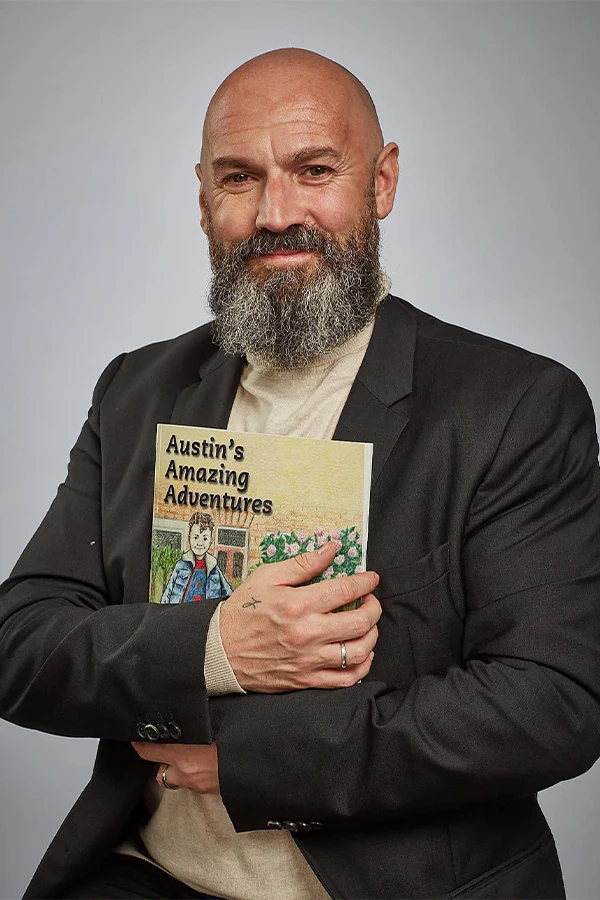
Changing Perceptions
As his retinas continue to deteriorate, Dave’s vision is changing. Where once he had a small tunnel of clear vision, it’s now a blur. and he’s realized he can no longer see faces. As blindness changes his perception of the world, he hopes to change the world’s perception of blindness too.
“I’m working with a director in London who wants to capture what it’s like for me to see at the moment. What it’s like to transition from being able to see a bit, to not being able to see faces anymore. The media, when they portray blindness, because they’re trying to appeal to the sighted world, feel the need to dumb it down, or not over-complicate it. That really adds to the misconceptions out there. With this project I want to make sure it’s not done that way. I know that sometimes, the conditions we have are so complicated that it’s even hard for those who are close to us to understand, but I hope this film will help people try.”
It’s been a pleasure getting to know Dave and learning about the ways he is making a difference for people with sight loss. It’ll be exciting to see where Austin’s adventures take him next, and we look forward to seeing how Dave’s sight loss is documented in the upcoming film. And of course, we will enjoy his poetry as it evolves, and continues to give a voice to those who need one.